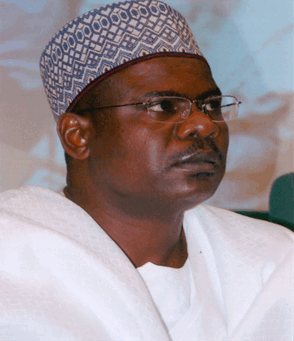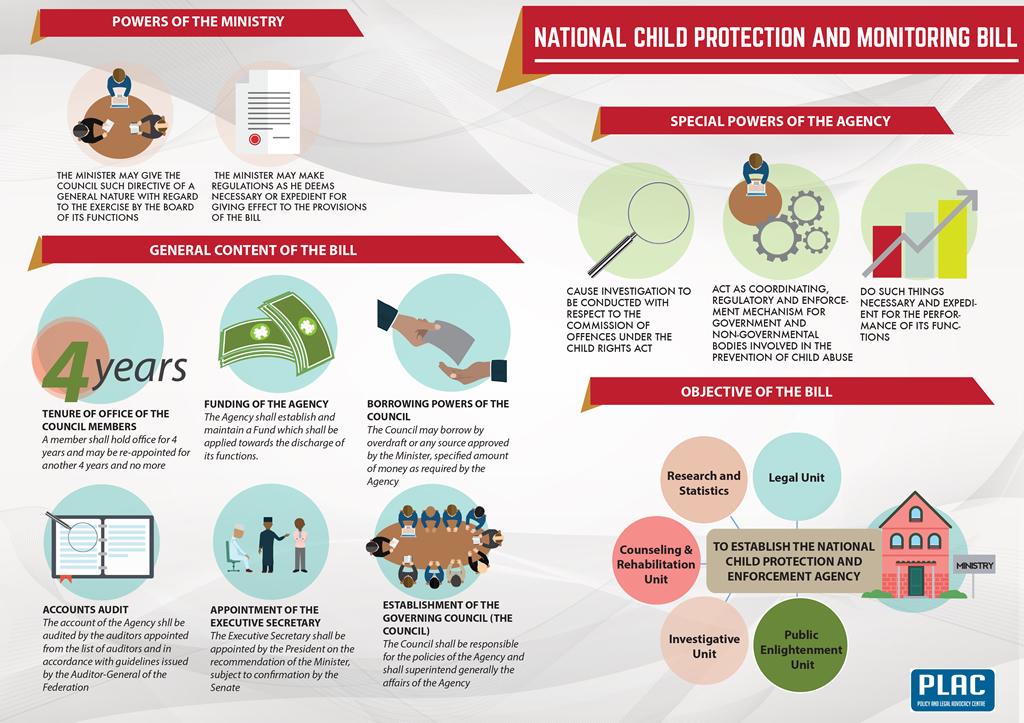HB 127: National Child Protection and Enforcement Agency (Establishment, etc.) Bill, 2016
Bill Analysis Download Bill Analysis Infograph
Sponsor:
Sen. Ali Ndume
State:
BORNOParty:
ALL PROGRESSIVES CONGRESSBill Status: Passed!
* This Bill was transmitted from the House of Representatives
- First Reading: 27/09/2016
- Second Reading: 11/07/2017
- Committee Referred To: Committee of the Whole
- Consolidated with:
- Date Reported out of Committee:11/07/2017
- Third Reading:11/07/2017
- Reconsidered and Passed:
Bill Analysis:
SHORT TITLE
National Child Protection and Enforcement Agency Bill, 2015
OBJECTIVE OF THE BILL
The objective of the Bill is:
- To establish the National Child Protection and Enforcement Agency, which shall have a governing council (“the Council”) responsible for its policies and shall also superintend generally the affairs of the agency
NUMBER OF CLAUSES/PARTS
The Bill has 5 parts and 23 clauses, including the miscellaneous section.
IMPLICATIONS
If the Bill is passed into law: -
- The National Child Protection and Enforcement Agency (“the Agency”) will be established to ensure child sensitive social protection policies that addresses child poverty;
- A governing council (“the Council”) shall be established to oversee the affairs of the Agency;
- The Agency shall have special units for the effective conduct of its functions;
- Funding of the Committee; Accounts and audit and other sources of funds.
PROVISIONS OF THE BILL
1. Establishment of the National Child Protection and Enforcement Agency (“the Agency”)
The key objective of the Bill is to establish the National Child Protection and Enforcement Agency (hereinafter called “the Agency”), which shall be a body that deals with all matters relating to the protection of children as guaranteed by the Constitution (as amended), other domestic laws and international laws operative in Nigeria.
2. Establishment of the Governing Council (“the Council”): -
Clause 2 of the Bill provides for the establishment of a governing council for the Agency, which shall be responsible for its policies and shall superintend generally the affairs of the Agency. The Council shall consist of the following members: -
- A Chairman
- A representative of relevant federal ministries and agencies, such as Women Affairs & Social Development; Education; Health; Justice; National Human Rights Commission; National Population Commission; a person not lower than the rank of a Commissioner of Police from the Nigerian Police Force; a representative of a Child Rights NGO; a member of the National Child Right Committee; a representative of the Christian Association of Nigeria; a representative of the Supreme Council of Islamic Affairs; a person from each geo-political zone; and the Executive Secretary of the Agency.
3. Tenure of Office of the Council Members: -
Clause 3 of the Bill provides that a member (except the Executive Secretary) shall hold office for 4 years and may be re-appointed for another term of 4 years and no more. Representative from geo-political zones shall serve on a rotational basis for a term of 4 years with no extension.
4. Functions and Powers of the Agency: -
The functions listed under Clause 5 (a) – (l) of the Bill include but not limited to dealing with the protection of children as guaranteed by the Constitution (as amended) and other relevant domestic and international laws operative in Nigeria; conducting researches on all matters relating to the protection of children and assist the government in the formulation of appropriate policies; compiling data regularly data on child rights violations in collaboration with relevant sectors; monitor and analyze patterns and trends of child rights violations in Nigeria
5. Special Powers of the Agency: -
The special powers of the Agency under the Bill include –
- Cause investigations to be conducted with respect to the commission of offences under the Child Rights Act;
- Act as coordinating, regulatory and enforcement mechanism for government and non-governmental bodies involved in the prevention of child abuse, child exploitation, the protection and rehabilitation of victims of such abuse;
- Other things necessary or expedient for the performance of its functions (Clause 6)
6. Establishment of Special Units: -
The Bill specifies that the Agency shall have the powers to set up Technical Committees and Task Forces to assist the Agency in the performance of its functions (Clause 7). The Agency shall have a Counseling and Rehabilitation Unit, as well as Investigative, Legal, Public Enlightenment and, Research and Statistics Units.
7. Functions of the Special Units: -
- Investigative Unit: - Shall investigate complaints and petitions received in respect of violations of the Child Rights Act. It shall also liaison with the Police and other relevant agencies for the prevention of offences and detention of offenders in violation of the Child Rights Act
- Legal Unit: - Shall ensure prosecution of offenders and violators of the Child Rights Act in collaboration with relevant agencies
- Counseling and Rehabilitation Unit: - Shall in collaboration with other relevant Agencies be responsible for counseling, aftercare rehabilitation, social reintegration and education of abused children;
- Public Enlightenment Unit: - Shall be responsible for campaigns, seminars and workshops aimed at educating the public on the provisions of the Child Rights Act;
- Research and Statistics: - Shall be responsible for the production of relevant documents and children’s data bank and resources.
8. Leadership of the Agency: -
Clause 9 of the Bill provides for appointment of an Executive Secretary by the President on the recommendation of the Minister, subject to confirmation by the Senate. The Executive Secretary shall hold office for 4 years and may be re-appointed for another 4 years on the recommendation of the Minister.
9. Funding of the Agency: - The Agency under Clause 14 provides that the Agency shall establish and maintain a fund, which shall be applied towards the discharge of its functions. The Agency shall accept gifts, testamentary depositions, endowments and contribution. However, gifts that are inconsistent with the functions of the Agency shall not be accepted.
10. Borrowing Powers of the Council: - Clause 16 of the Bill provides that the Council may borrow by overdraft or any source approved by the Minister specified amount of money as required by the Agency. The Council shall be empowered under Clause 16(2) to invest all or any of its funds with the consent of the Minister
11. Accounts of the Agency: - The Council shall cause to be prepare, not later than 30th September in each year, an estimate of the expenditure and income of the Agency during the next succeeding year, and when prepared shall be submitted to the Minister.
12. Auditing of the Agency’s Accounts: - Under Clause 17(3), the Bill provides that the account of the Agency shall be audited by auditors appointed from the list of auditors and in accordance with guidelines issued by the Auditor-General of the Federation.
The report shall be submitted through the Minister not later than 6 (six) months after the end of each year.
13. Powers of the Minister: -
- Directives: - The Minister may give the Council such directive of a general nature with regard to the exercise by the Board of its functions.
- Regulations: - The Minister may make regulations as he deems necessary or expedient for giving effect to the provisions of this Bill (when passed into law).
14. Conditions of Service: -
The Agency shall with the approval of the Minister determine its conditions of service, including pensions and gratuities (Clause 12). The service in the Agency is a scheduled service and shall be deemed to be pensionable under the Bill (when passed into Law)
ANY SIMILAR EXISTING BILL
The National Council for Widows, Dependent Children, and Orphans and for Other Matters Related Bill sponsored (HB 124) by Hon. Ayuba Mohammed Bello
CONCLUDING ISSUES
The Bill seeks to establish a National Child Protection and Enforcement Agency in Nigeria to cater to child rights issues, and to ensure appropriate response to violation of provisions of the Child Rights Act, 2003. The overall purpose is to have a separate body distinct from the Ministry of Women Affairs solely responsible for the welfare of children.
Though the Bill did not define the term “child”, it is assumed that the definition of the Child Rights Act applies. The Bill referred to the Minister, as the “appropriate supervisory minister”; it could be assumed that this is the Minister for Women Affairs, which means that the Agency shall be under the Ministry of Women Affairs. The Bill needs to be clear on this.
Another Bill before the House of Representatives seeking to establish a body responsible for child welfare is the National Council for Widows, Dependent Children and Orphans Bill. The similarity lies in the function of two bodies that both Bills seek to create – protecting the rights of vulnerable persons, which includes children. The two Bills should be harmonized to establish one body or agency to avoid duplicating functions.
Infographic:
